Grace Grows Science, Ag to Complement Local Industries
 The facility’s namesake
The facility’s namesake
Subscriber Benefit
As a subscriber you can listen to articles at work, in the car, or while you work out. Subscribe NowGrace College in northern Indiana is taking a leap forward in two areas it says are of great importance in the region. Surrounded by a strong agricultural presence, the school is adding an agribusiness degree program, and a new science facility acknowledges Grace’s connection to the local orthopedic sector and aims to prepare graduates for cutting-edge science careers.
School leaders say its science and mathematics department has grown six-fold in the last four decades to now include more than 250 students; as more enrolled in the program, faculty grew and the need for an updated facility became a top priority for Grace College.
“Students who come to visit…but look at our facility and say, ‘Well, I think I’m going to go somewhere else’—they’re now going to come to us. It’s going to be that impressive,” says Grace College Science and Mathematics Department Chair Dr. Chad Snyder. “We’re going to have a lot of brand-new equipment, and our facilities are going to look so nice—that, alone, is going to attract a lot of students who may have, otherwise, gone somewhere else because they weren’t wowed by what our building currently has to offer.”
The $8 million Dr. Dane A. Miller Science Complex measures 35,000 square feet; about one-third will be newly-constructed science facilities, and the remaining portion will be renovated space. Snyder says the investment includes updated instruments in laboratories and classroom audio visual technology for collaborative teaching and research. It will also increase office space, house a center for lakes and streams research and new labs for a chemistry degree planned for 2018.
“Students will have increased space to do research in, which is becoming a growing goal for us in the department—to include more students in faculty-led scientific and mathematical research,” says Snyder.
The facility’s namesake, the late Dr. Dane Miller, was co-founder and 39-year president and chief executive officer of local orthopedic giant Biomet, now Zimmer Biomet. The center underscores the university’s close ties with Warsaw’s orthopedic sector; the school has developed two orthopedic degree programs with a third in the works, and says hundreds of alumni work in the sector.
Also connecting to the local economic landscape is the school’s new agribusiness degree program, launching this fall. Surrounded by a variety of agricultural companies, Grace College School of Business Dean Dr. Jeffrey Fawcett says agriculture was a missing piece in its program.
“Fifteen miles north of us, you’ve got Chore-Time Brock, and eight miles north, you’ve got Maple Leaf Farms. Due west is Mentone and all of the ag producers there. If you go south, you’ve got Louis Dreyfus Company. [Ag] is everywhere, so varied, and there’s so much going on,” says Fawcett. “Tom Farms is plowing 18,000 acres, Bishop Farms has 5,000 acres—this all is a great opportunity for students to get their hands dirty and involved in an industry we weren’t touching.”
Fawcett says Grace is hopeful the program will help keep graduates in the region and promote “brain gain,” growing the local agricultural work force. The school says a unique aspect of the degree is a required eight-month internship for agribusiness students, something local agriculture companies requested. Fawcett says the extended internships mean students will experience the full production cycle, including preparation and planting, growing and harvesting.
“One of the things we like to do here at Grace is go into the industry and say, ‘What is it that you need?’, not what we think we can create,” says Fawcett. “We talked to farms in the area and other organizations, asking them, ‘What would the skillset look like for somebody you were going to bring onto your farm to help run the business side of things?’”
Grace will begin offering the agribusiness program in the fall, and Fawcett says the school is already halfway to its enrollment goal for the first year, “and we really haven’t started pushing much yet.” Once established, Fawcett expects about 50 students total working toward the agribusiness degree.
“From the very beginning, we’ve been creators and cultivators made in God’s image to do that. When I think about the biblical precedent here, back in Genesis 2, God put Adam in the garden and instructed him to take care of it,” says Fawcett. “That’s exciting for us to be part of a system to get young people excited about agriculture and to move into that field—preparing them to plug into our local economy and help Indiana get better at what we do.”
Fawcett says the strong presence and diverse nature of the local agricultural sector highlighted the need for an agribusiness program.
Snyder says the new facility takes science and math “to the next level” at the university.
